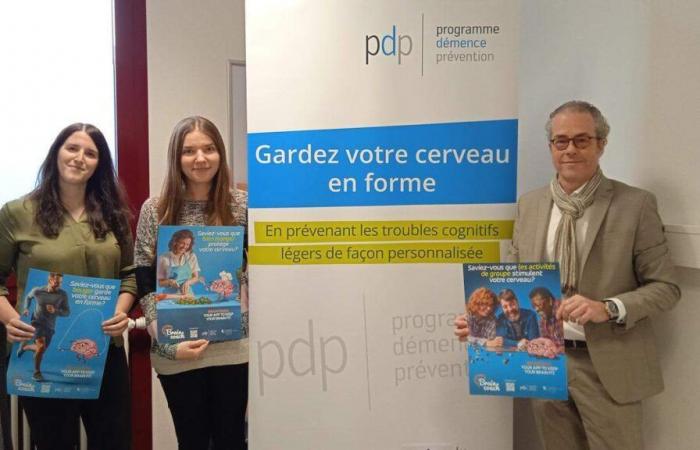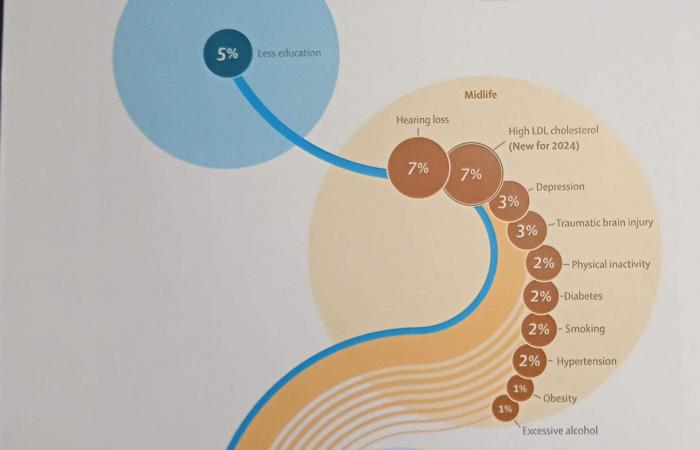“How old are you?”, “How tall are you?”, “What is your weight?”. These questions are not asked by the attending physician, but by the Braincoach application. Designed in Luxembourg, it aims to prevent dementia. This refers to an alteration of capacities linked to memory, thinking and autonomy. It mainly affects older people.
“Braincoach is used to detect the potential for the development of neurodegenerative diseases,” says Dr. Rejko Krüger, coordinator of the dementia prevention program (PDP). Braincoach is developed as part of this program. “The user is asked a series of questions when they first log in. Their answers allow us to know if there are any potential risk factors.”
The doctor and his team base themselves on fourteen scientifically proven variables. They include physical activity, obesity and depression. “By acting on these modifiable risk factors, we can prevent up to 45% of dementia,” estimates the professional.
A free and accessible tool
Braincoach was therefore created to anticipate neurodegeneration. “The average age of people coming to our program with initial cognitive disorders is 68 years old,” explains Amna Skrozic, neuropsychologist at the PDP. They are sent by the attending physician.”
“With Braincoach, we want to reach people before they notice the first symptoms,” adds Dr. Krüger. “The application is free and does not depend on a prescription from a health professional. However, in the event of identified risk factors, it is recommended to discuss this with your treating physician.”
Currently, all residents of the Grand Duchy can download the application on their phone. To adapt to the country’s multilingualism, the content is available in French, English and German. Everyone chooses the language they prefer.
Residents of the Greater Region, whether on the French or Belgian side, can access the content via the web page.
Staying healthy in a fun way
According to Doctor Krüger, 22,000 people have cognitive complaints in Luxembourg. With Braincoach, he wants to reach a younger population. “All adults are targeted, particularly those in their forties. For their part, young people in their twenties do not feel the need to take action against this issue. Old age seems very far away to them. Ultimately, the application is recommended for those who do not yet have memory alterations.”
The principle of Braincoach remains simple and fun. Every day the user logs in and opens a nut. Inside it is advice, a personalized challenge or information on an identified risk factor. “The app can challenge you to cook a balanced dish or offer you a walk in the Grand Duchy.”
“Braincoach’s strength lies in its local roots,” adds Amna Skrozic. We receive feedback from program participants who have downloaded the app. They all believe that these daily challenges provide good motivation to stay active. They can stay peacefully at home and obtain a wide variety of information. They are also encouraged to think. For example, they know Luxembourg, but discover nice places to go for walks.”
“Early detection of neurodegeneration”
“People who register on the application may be invited to participate in questionnaires,” adds Dr. Krüger. The answers will be used for future research. We want to know to what extent Braincoach influences their lives.”
“In addition, this tool is a help for those who do not yet suffer from cognitive disorders. The Luxembourg Alzheimer’s Association often tells us that it sees patients once it is already late to slow the progression of dementia. So Braincoach aims to raise awareness among the general population. And to allow early detection of neurodegeneration.”
“For example, if you make sudden movements or talk in your sleep, this could be a warning sign. The chance that you will develop Parkinson’s or a related disease within the next ten years is 80%.
“When it comes to neurodegenerative disease, we have the impression of being unable to do anything,” says neuropsychologist Amna Skrozic. However, if we all live healthily and talk about these risk factors around us, the symptoms can be partly anticipated.”
“Braincoach represents motivation for healthy aging,” continues the professor of neuroscience. Life expectancy is around 85 years today. The challenge now is not to reach an even older age, but to obtain a better quality of life.”
The Netherlands as an example
The application was developed as part of the dementia prevention program, supported by the Ministry of Health. “This program has been running for seven years. Its objective is to stimulate patients to improve their pace of life.”
Dr. Krüger and his colleagues were inspired by an initiative set up in Maastricht a few years ago. “They launched Braincoach brilliantly, and we chose to use them as a model.”
Although the application has become functional in Luxembourg, the work of professionals does not stop. “This is a continuous process,” emphasizes the doctor. We collect the first feedback from registrants. At the same time, we are integrating new scientifically proven risk factors into the application.”
From now on, the health consequences of air pollution will be taken into account, as will cholesterol levels and loss of vision.
To date, more than 3,000 participants log on to Braincoach every day. The majority of them reside in Luxembourg. In the long term, Dr. Krüger wants to be ambitious. “Luxembourg has more than 672,000 inhabitants. So our goal is to make everyone aware of dementia,” he smiles.







